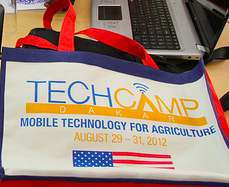Notes from TechCamp Dakar
 Last week I had the good fortune to attend TechCamp Dakar, the first of U.S. Secretary of State Hillary Clinton's "Civil Society 2.0" initiatives to be held on the continent.
The two-day gathering focused on mobile technologies in agriculture. Given the recurring food crises in the Sahel, examining how Senegalese NGOs can leverage technology for better programming, advocacy and coordination was a good one and over 50 organizations working in agriculture were in attendance, supported by local technology leaders, including us. Check out some of the photos here.
Last week I had the good fortune to attend TechCamp Dakar, the first of U.S. Secretary of State Hillary Clinton's "Civil Society 2.0" initiatives to be held on the continent.
The two-day gathering focused on mobile technologies in agriculture. Given the recurring food crises in the Sahel, examining how Senegalese NGOs can leverage technology for better programming, advocacy and coordination was a good one and over 50 organizations working in agriculture were in attendance, supported by local technology leaders, including us. Check out some of the photos here.
Here's a look at the technologies presented and a few of the applications the NGOs found for those technologies in their agricultural programming:
- Social media: Marieme Jamme of SpotOne Global Solutions and Apps4Africa presented on the importance of using social media to gain visibility, credibility and funding. She compared social media to the traditional African "arbre a palabre," or palaver tree, to remind participants that the concept of sharing and debating about issues is a familiar one. Some participants later created a Facebook group "L'arbre à palabre des acteurs agricole du Sénégal" to better reach local agriculturalists and include them in online discussion.
- Community mapping: Open Street Map was in attendance, showing participants the usefulness of visualizing data when planning a program or community outreach. I later participated in a small group session that sought to apply Open Street Maps to community water management of drylands areas.
- Group networking sites: MeetUp was in attendance, although their paid service model received less enthusiastic support from Senegalese who weren't likely to have a credit card set up to create a group online. At Code Innovation, we like free and open source group networking sites like Crabgrass, as they provide the fewest barriers to entry.
- Low-cost video: FHI 360 presented a strong case for the ease of use and scalability of low-cost video as a training and communication technology alongside the more traditional agricultural extension agents, field days and demonstration plots. FHI 360 brought along several relatively low-cost cameras and a USB-chargeable mini pico projector for video screenings. Many NGOs saw the potential for low-cost video to aid their agricultural trainings, especially in communicating about new methods and creating the motivation to try them.
- Mobile money: A private sector organization, E-Amarante, presented Mobile Cash, a local interpretation of the East African service MPesa that's still in development. Although the system is interoperable across mobile networks, participants baulked at the 3-5% fees levied on mobile transfers and transactions. All the same, mobile money has a bright future on the continent, and the leading mobile network operators here in Senegal already have their own programs and versions--with a similar fee structure.
- SMS: FrontlineSMS was in attendance with a simple demo of how SMS could be used for data collection and crowdsourcing, and showed briefly how to link the system with Ushahidi for data visualization on a map. In my small group, participants saw the relevance for communicating within agricultural cooperatives and about market prices, but would likely need some technical support to set up the system.
- Google Apps: Presented by People Input, the Google Suite of programs were well presented and enthusiastically received. File-sharing and keeping easily accessible versions of current documents seemed to be major coordination challenges for the NGOs present, and most of the larger group work focused on integrating Google Apps tools into communications protocols to make partnering and information sharing more effective.
- Mobile phone market information: Africa Market Price, another project by E-Amarante, seeks to communicate local market prices to rural farmers by SMS, as similar projects across the continent have done.
- Webcasting: CarRapide TV presented its YouTube channel of citizen reporting and spoke about the benefits of web broadcasting to reach large audiences of agricultural producers.
After they'd had a chance to learn about specific technologies more in-depth, participants worked together in small groups to brainstorm major problems they encounter in their day-to-day work, and then examined how a selected technology could help them meet those challenges. There was intense work in small groups around issues including managing water, communicating market prices, and inter-organizational collaboration. As a final exercise, small groups were tasked with creating next steps on how to work together to put these technological tools into practice. The results will be shared internally on the TechCamp Dakar Facebook group and on the public TechCamp Dakar wiki.
One of the best parts of TechCamp, for me, was seeing how focused the NGOs were on solving their challenges through technology together. For many of them, technology was a tool that enabled wider partnership and clearer, more precise communication around their program objectives. They were keenly focused on problem-solving and highly motivated to work together. It will be interesting to see how collaboration continues now that the intensity of TechCamp has passed.
It was also great to meet fellow technology people working in Senegal, including Karim Sy of JokkoLabs in Dakar and the team from Bantalabs up in St. Louis, who have programming expertise and can help to put teams together.
Here at Code Innovation, we're interested in what happens after TechCamp Dakar, particularly if and how NGOs will incorporate these new mobile technologies into their programming, where and why they succeed, and where and why they run into hurdles. We'll be spending time on the Facebook group checking in on their progress and seeing where we can lend a hand.
